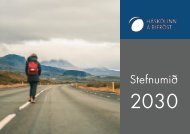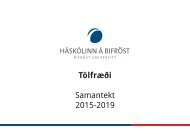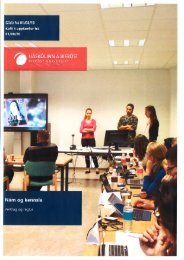Handbook - Quality Enhancement and Assurance
Create successful ePaper yourself
Turn your PDF publications into a flip-book with our unique Google optimized e-Paper software.
Valid from<br />
01/08/19<br />
Umbótamiðað<br />
gæðastarf<br />
Umbótamiðað gæðastarf<br />
Verklag og reglur<br />
Umbótamiðað<br />
gæðastarf<br />
Umbótamiðað<br />
<strong>Quality</strong> <strong>Enhancement</strong> <strong>and</strong><br />
<strong>Assurance</strong><br />
gæðastarf<br />
Rules <strong>and</strong> procedures<br />
Umbótamiðað gæðastarf<br />
Verklag og reglur<br />
Umbótamiðað gæðastarf<br />
Umbótamiðað gæðastarf<br />
Verklag og reglur<br />
Verklag og reglur<br />
1
Table of contents<br />
<strong>Quality</strong> enhancement <strong>and</strong> assurance ............................................................................................................. 1<br />
1. Procedures for departmental Subject-Level Reviews ............................................................................... 1<br />
1.1 Responsibility for Subject-Level Reviews ..................................................................................... 1<br />
1.2 Timing ............................................................................................................................................ 1<br />
1.3 Implementation of Subject-Level Reviews .................................................................................... 1<br />
1.4 Content of the Subject-Level Review Report ................................................................................. 2<br />
1.5 Departmental follow-up on Subject-Level Reviews ...................................................................... 3<br />
2. Procedures for on-going monitoring <strong>and</strong> periodic review of programmes .............................................. 3<br />
2.1 Responsibility ..................................................................................................................................... 3<br />
2.2 Timing ................................................................................................................................................ 3<br />
2.3 Implementation of programme quality review ................................................................................... 3<br />
2.4 Content of review report ..................................................................................................................... 4<br />
3. Rules on design <strong>and</strong> approval of programmes at Bifröst University ........................................................ 5<br />
3.1 Responsibility ..................................................................................................................................... 5<br />
3.2 General considerations on the establishment of new study programmes ........................................... 5<br />
3.3 Implementation ................................................................................................................................... 5<br />
4. Procedures for Reflective Analysis .......................................................................................................... 7<br />
4.1 Responsibility ..................................................................................................................................... 7<br />
4.2 Implementation ................................................................................................................................... 7<br />
4.2.1 Main activities in implementation of the Reflective Analysis: ................................................... 7<br />
4.2.2 Case Study ................................................................................................................................... 8<br />
4.3 Structure of the Reflective Analysis Report ....................................................................................... 9<br />
5. Procedures for revising procedural rules or strategy ................................................................................ 9<br />
Reviewed at a meeting of the University Council, May 15 th 2019<br />
Approved by the Rector, June 4 th 2019<br />
This is a translation of the document Umbótamiðað gæðastarf – verklag og reglur. In the event of any discrepancies between the translation <strong>and</strong> the<br />
original text, the original shall take precedence.<br />
0
<strong>Quality</strong> enhancement <strong>and</strong> assurance<br />
This manual contains rules <strong>and</strong> procedures pertaining to improvement-oriented quality assurance at<br />
Bifröst University. <strong>Quality</strong> assurance at Bifröst University builds on the second edition of the <strong>Quality</strong><br />
<strong>H<strong>and</strong>book</strong> for Icel<strong>and</strong>ic Higher Education (QEF2), 1 the St<strong>and</strong>ards <strong>and</strong> Guidelines for <strong>Quality</strong> <strong>Assurance</strong><br />
in the European Higher Education Area (ESG, 2015) <strong>and</strong> Icel<strong>and</strong>ic legislation <strong>and</strong> regulations on quality<br />
monitoring at higher education institutions in Icel<strong>and</strong>. The policy <strong>and</strong> st<strong>and</strong>ard procedures of Bifröst<br />
University concerning quality, learning, teaching <strong>and</strong> research at the University shall also be taken into<br />
account.<br />
1. Procedures for departmental Subject-Level Reviews<br />
Subject-Level Reviews are conducted regularly within departments in order to secure the st<strong>and</strong>ards of<br />
awards <strong>and</strong> degrees, bring about quality improvements <strong>and</strong> ensure the quality of administrative practice,<br />
teaching, learning, assessment of studies <strong>and</strong> the student learning experience. They also serve to assess<br />
the quality of research activities within departments.<br />
1.1 Responsibility for Subject-Level Reviews<br />
The Rector is responsible for quality management at the University, together with the Director of <strong>Quality</strong><br />
Management. The Head of Department is responsible for the implementation of the Subject-Level<br />
Review, in cooperation with the Department Board <strong>and</strong> the Director of <strong>Quality</strong> Management.<br />
1.2 Timing<br />
Subject-Level Reviews follow the University’s seven-year plan for improvement-oriented quality<br />
assurance. The Subject-Level Review should not take longer than one to two semesters <strong>and</strong> should finish<br />
with publication of a report.<br />
1.3 Implementation of Subject-Level Reviews<br />
The Department Board appoints a Self-Evaluation Team for each Subject-Level Review. Students<br />
participate in the review process as direct participants in the Self-Evaluation Team, as well as through<br />
teaching evaluation surveys <strong>and</strong> meetings <strong>and</strong> through student representation on the Department Board.<br />
An international expert is appointed to the Self-Evaluation Team <strong>and</strong> works as per a letter of<br />
appointment. In conducting the Subject-Level Review, the following shall be taken into account:<br />
1. Departments submit a schedule for the Subject-Level Review <strong>and</strong> a plan for programme review to<br />
the Director of <strong>Quality</strong> Management for each seven-year quality cycle. This shall be accompanied<br />
by nominations for international experts to work as external advisors in the Subject-Level Review<br />
<strong>and</strong> their letters of appointment.<br />
2. Under the Bifröst University Regulations, the Department Board is responsible for<br />
implementation of quality control within the department <strong>and</strong> shall appoint members of a team that<br />
leads the Subject-Level Review.<br />
3. The Department Board shall appoint not fewer than two students to the Self-Evaluation Team.<br />
Students receive training <strong>and</strong> support to take part in the Subject-Level Review.<br />
1<br />
https://en.rannis.is/media/gaedarad/Final-for-publication-14-3-2017.pdf<br />
1
4. The Director of <strong>Quality</strong> Management meets with the Self-Evaluation Team <strong>and</strong> presents the<br />
processes, instructions <strong>and</strong> guidelines involved in quality control.<br />
5. The Self-Evaluation Team appoints a chairperson, who manages the team’s work <strong>and</strong> authors a<br />
progress report for the Department Board <strong>and</strong> the Director of <strong>Quality</strong> Management.<br />
6. The Self-Evaluation Team begins the process by making decisions concerning the main points of<br />
emphasis, methodology <strong>and</strong> data collection. It is important to identify all stakeholders to ensure<br />
that their viewpoints emerge.<br />
7. It is necessary to define comparisons with universities, departments or units that will be utilised in<br />
the Subject-Level Review, as needed at any given time.<br />
8. The Self-Evaluation Team divides responsibilities <strong>and</strong> tasks according to the time frame given.<br />
The Self-Evaluation Team may appoint subgroups for specific tasks in the review.<br />
9. The chair of the Self-Evaluation Team is responsible for the review being conducted according to<br />
plan.<br />
10. Regular status meetings shall be held with the Self-Evaluation Team, Head of Department <strong>and</strong><br />
Director of <strong>Quality</strong> Management throughout the review period.<br />
11. The Self-Evaluation Team is responsible for data <strong>and</strong> information collection. If a situation arises<br />
where the Self-Evaluation Team finds data or information to be insufficient, the Self-Evaluation<br />
Team must provide a clear explanation for why this is so <strong>and</strong> make recommendations on how to<br />
redress this.<br />
12. The Department Board may decide to cover specific areas within a department that are deemed<br />
important to include in the review, in addition to what is recommended in the QEF2.<br />
13. The Self-Evaluation Team delivers a written report, with an improvement plan (including a time<br />
schedule) <strong>and</strong> other recommendations for action.<br />
14. The Self-Evaluation Team maintains a record of meeting minutes <strong>and</strong> formally documents<br />
decision-making.<br />
15. The Director of <strong>Quality</strong> Management provides counsel <strong>and</strong> support during the process.<br />
1.4 Content of the Subject-Level Review Report<br />
It is important that the Subject-Level Review be critical <strong>and</strong> carefully reasoned. The Subject-Level<br />
Review Report should be an honest, unreserved <strong>and</strong> analytical discussion of the current situation <strong>and</strong><br />
future prospects. In this way, the Subject-Level Review can function as a foundation for advancement<br />
<strong>and</strong> improvement<br />
In this context, previous Subject-Level Reviews shall be taken into account, <strong>and</strong> improvement-oriented<br />
activities shall be reported upon. Potentially, the current Subject-Level Review may reflect upon how<br />
earlier Subject-Level Reviews have led to strategic planning <strong>and</strong> development at the departmental level.<br />
It may be anticipated, in many instances, that numerical information forms an evidence base supporting<br />
the findings of the Subject-Level Review. It is necessary to refer to these sources, as needed. Guest<br />
access shall be provided to teaching materials, <strong>and</strong> the external evaluation committee shall be provided<br />
with the technical service needed.<br />
The Subject-Level Review Report shall be written in English <strong>and</strong> proofread. It is recommended that the<br />
chair of the Self-Evaluation Team edit the report.<br />
Work on the Subject-Level Review shall normally not take longer than one to two semesters, <strong>and</strong> the<br />
Subject-Level Review Report for a given department shall normally not exceed 30–40 pages, in addition<br />
to annexes. It is expected that the final version of the Subject-Level Review Report for a given<br />
department will be ready two months after the review itself takes place.<br />
2
The template 2 for the Subject-Level Review provides guidelines on the desired content of the Subject-<br />
Level Review Report, but it is not exhaustive. The editor of the Subject-Level Review Report may decide<br />
to divide chapters differently than presented in the template. However, in matters of content an effort<br />
shall be made to adhere to the guidelines of the QEF2 <strong>and</strong> ESG 2015.<br />
1.5 Departmental follow-up on Subject-Level Reviews<br />
Follow-up shall begin with an action plan, based on the recommendations of the Self-Evaluation Team<br />
<strong>and</strong> the comments of the external experts. The Head of Department <strong>and</strong> Department Board are<br />
responsible for follow-up on Subject-Level Reviews.<br />
2. Procedures for on-going monitoring <strong>and</strong> periodic review of<br />
programmes<br />
Regular evaluation of the quality of study programmes is conducted in order to secure the st<strong>and</strong>ards of<br />
awards <strong>and</strong> degrees <strong>and</strong> bring about quality improvements in teaching, learning, assessment of studies<br />
<strong>and</strong> the student learning experience. Periodic reviews also function to examine whether objectives set for<br />
a programme at the time that it was first established or most recently reviewed have been achieved,<br />
whether the programme is in line with the University’s strategy <strong>and</strong> whether it responds to the needs of<br />
students <strong>and</strong> society.<br />
2.1 Responsibility<br />
The Rector is responsible for quality management at the University, together with the Director of <strong>Quality</strong><br />
Management. The Head of Department is responsible for periodic review of the quality of study<br />
programmes, in cooperation with the Department Board <strong>and</strong> the Director of <strong>Quality</strong> Management.<br />
2.2 Timing<br />
Periodic reviews of the quality of study programmes follow the University’s seven-year plan for<br />
improvement-oriented quality assurance. A formal review should not be expected to take longer than one<br />
to two semesters, <strong>and</strong> programmes shall normally be reviewed at three-year intervals. Between scheduled<br />
reviews, evaluation of programme quality shall be conducted if obvious problems call for corrective<br />
action.<br />
2.3 Implementation of programme quality review<br />
Evaluation of the quality of study programmes involves substantial review of the study programme as a<br />
whole, including learning outcomes, the description <strong>and</strong> goals of the study programme, the composition<br />
<strong>and</strong> content of courses <strong>and</strong> other important factors relating to programme quality.<br />
Reviews of study programmes are the responsibility of the Head of Department, who receives the<br />
assistance of the Department Board <strong>and</strong> the Director of <strong>Quality</strong> Management, with the participation of<br />
instructors, students <strong>and</strong> external stakeholders as applicable.<br />
Reviews of study programme quality must be critical <strong>and</strong> carefully reasoned. In order for reviews to<br />
function as an effective foundation for advancement <strong>and</strong> improvement, discussion should be unreserved<br />
2<br />
See the template Skýrsluform vegna sjálfsmats deilda, which may be used as the foundation for the report.<br />
3
<strong>and</strong> provide a solid analysis of the current situation <strong>and</strong> future prospects. In reviewing programme<br />
quality, the following shall be taken into account:<br />
1. Departments submit a plan for reviewing programme quality to the Director of <strong>Quality</strong><br />
Management for the time period defined in the QEF2.<br />
2. The Head of Department assembles an evaluation team, which operates in accordance with the<br />
review plan on programme quality. The evaluation team shall include two student representatives<br />
in the later years of their study programmes. Students receive training <strong>and</strong> support to take part in<br />
the review.<br />
3. The Director of <strong>Quality</strong> Management meets with the evaluation team <strong>and</strong> presents the processes,<br />
instructions <strong>and</strong> guidelines involved in quality control.<br />
4. The evaluation team appoints a chairperson, who manages the team’s work <strong>and</strong> authors a progress<br />
report for the Department Board <strong>and</strong> the Director of <strong>Quality</strong> Management.<br />
5. As part of the periodic review process, the evaluation team makes use of a template in drafting its<br />
report. This template contains helpful information on the desired content of the review.<br />
6. At the outset of the review, the evaluation team makes decisions concerning the main points of<br />
emphasis, methodology <strong>and</strong> data collection. It is important to identify all stakeholders to ensure<br />
that their viewpoints emerge.<br />
7. The evaluation team produces a report on the basis of the data obtained <strong>and</strong> analysis that takes<br />
place during the review. It is important that recommendations be accompanied by a list of<br />
prioritised actions <strong>and</strong> improvement projects, for which a responsible party shall be designated to<br />
follow up on tasks <strong>and</strong> activities.<br />
8. The evaluation team delivers its evaluation report to the Head of Department, who submits the<br />
report to the Department Board for discussion.<br />
9. The Head of Department is responsible for ensuring that information concerning revisions to<br />
study programmes is passed on to the Director of Academic Services.<br />
10. The evaluation team maintains a record of meeting minutes <strong>and</strong> formally documents decisionmaking.<br />
11. The Director of <strong>Quality</strong> Management provides counsel <strong>and</strong> support during the process.<br />
2.4 Content of review report<br />
A template (Skýrsluform fyrir reglubundið mat á gæðum námslína) 3 provides guidelines on the desired<br />
content of the report for a review of programme quality, but it is not exhaustive. The report’s editor may<br />
decide to divide chapters differently than presented in the template. However, in matters of content an<br />
effort shall be made to adhere to the guidelines of the QEF2 <strong>and</strong> ESG 2015.<br />
3<br />
See the template Skýrsluform fyrir reglubundið mat á gæðum námslína.<br />
4
3. Rules on design <strong>and</strong> approval of programmes at Bifröst University<br />
The objective of these rules is to ensure professional st<strong>and</strong>ards in the development of new lines of study<br />
<strong>and</strong> degree programmes at Bifröst University.<br />
3.1 Responsibility<br />
The Rector is responsible for quality management at the University, together with the Director of <strong>Quality</strong><br />
Management. The Head of Department <strong>and</strong> Department Board are responsible for professionalism in the<br />
development of new study programmes within individual departments.<br />
3.2 General considerations on the establishment of new study programmes<br />
Study programmes form the core of teaching activities within an education institution. They provide<br />
students with academic knowledge <strong>and</strong> competences that affect their personal development <strong>and</strong> can be<br />
utilised by students in their future careers. When establishing a new study programme, the following<br />
considerations must be taken into account. A new study programme shall:<br />
1. be designed in conformity with the policy of Bifröst University <strong>and</strong> have well-defined learning<br />
outcomes,<br />
2. be designed with participation from students <strong>and</strong> other stakeholders,<br />
3. be designed with the input of external experts, taking external st<strong>and</strong>ards into account,<br />
4. be designed in line with normal study progress for students,<br />
5. include a definition of the student workload (measured in ECTS credits),<br />
6. involve well-defined opportunities for internships (where applicable),<br />
7. be subject to a well-defined approval process.<br />
3.3 Implementation<br />
Design of new study programmes is a departmental activity <strong>and</strong> therefore the responsibility of the Head<br />
of Department <strong>and</strong> Department Board <strong>and</strong> Director of <strong>Quality</strong> Management, with the participation of<br />
instructors, students <strong>and</strong> external stakeholders as applicable. The assistance of administrative <strong>and</strong> service<br />
departments at the University shall be sought as needed. A file shall be maintained on all decisions <strong>and</strong><br />
activities in this context. This file shall contain a record of the minutes of all meetings called. The<br />
following shall be stated, among other things:<br />
• what procedures have been used in preparing a new study programme,<br />
• who is involved,<br />
• what external parties have been contacted for consultation,<br />
• what comparisons have been made with other higher education institutions,<br />
• what opinions have been sought from professional bodies, business organisations <strong>and</strong> individual<br />
companies <strong>and</strong> institutes.<br />
Furthermore, it shall come forth how the following factors have been taken into account:<br />
• the changing needs of society for university-level education,<br />
• student workload, study progress <strong>and</strong> completion of studies,<br />
• the effectiveness of yardsticks for assessment of students,<br />
• the learning environment <strong>and</strong> support services <strong>and</strong> their fitness for the study programme,<br />
• market conditions <strong>and</strong> possible exploration of dem<strong>and</strong> for the programme.<br />
5
In other regards, establishment of new study programmes at Bifröst University shall take into account the<br />
guidance of the <strong>Quality</strong> <strong>H<strong>and</strong>book</strong> for Icel<strong>and</strong>ic Higher Education (QEF2) <strong>and</strong> the St<strong>and</strong>ards <strong>and</strong><br />
Guidelines for <strong>Quality</strong> <strong>Assurance</strong> in the European Higher Education Area (ESG, 2015).<br />
Processes for establishing new study programmes within departments shall be reported upon in Subject-<br />
Level Reviews at the departmental level.<br />
Heads of Department deliver recommendations on new study programmes to the Rector. The Rector puts<br />
such a recommendation to the Board of Governors for confirmation. New study programmes shall be<br />
presented in the University Council.<br />
6
4. Procedures for Reflective Analysis<br />
The Reflective Analysis is intended to function as a critical, open <strong>and</strong> analytical assessment of<br />
improvement-oriented quality assurance within the departments <strong>and</strong> divisions of the University Particular<br />
attention shall be given to (a) the University’s performance in safeguarding the quality of programmes<br />
<strong>and</strong> awards, (b) the student learning experience <strong>and</strong> (c) management of research. It is important to report<br />
upon how the University’s strategy <strong>and</strong> plans are being reflected in its internal operations <strong>and</strong><br />
development work.<br />
The primary objective of the Reflective Analysis is to explain how the institution intends to develop <strong>and</strong><br />
enhance the learning experience of its students <strong>and</strong> how the institution plans to safeguard the academic<br />
st<strong>and</strong>ards to which universities are held.<br />
The Reflective Analysis should reflect the University’s ability to carry out critical self-evaluation <strong>and</strong><br />
forms the main foundation for the Institution-Wide Review, which is conducted by the <strong>Quality</strong> Board for<br />
Icel<strong>and</strong>ic Higher Education.<br />
4.1 Responsibility<br />
The Rector is responsible for quality management at the University, together with the Director of <strong>Quality</strong><br />
Management. The Rector <strong>and</strong> Director of <strong>Quality</strong> Management are responsible for the Reflective<br />
Analysis, together with the Self-Evaluation Team.<br />
4.2 Implementation<br />
Bifröst University has the freedom to decide how the Reflective Analysis will take place <strong>and</strong> what main<br />
points of emphasis will form the basis of the Reflective Analysis at any given time. At the same time, the<br />
Reflective Analysis shall build on the second edition of the <strong>Quality</strong> <strong>H<strong>and</strong>book</strong> for Icel<strong>and</strong>ic Higher<br />
Education (QEF2), the St<strong>and</strong>ards <strong>and</strong> Guidelines for <strong>Quality</strong> <strong>Assurance</strong> in the European Higher<br />
Education Area (ESG, 2015) <strong>and</strong> Icel<strong>and</strong>ic legislation <strong>and</strong> regulations on quality monitoring at higher<br />
education institutions in Icel<strong>and</strong>. The policy <strong>and</strong> st<strong>and</strong>ard procedures of Bifröst University concerning<br />
quality, learning, teaching <strong>and</strong> research at the University shall also be taken into account.<br />
4.2.1 Main activities in implementation of the Reflective Analysis:<br />
1. The Rector appoints an evaluation team, which leads the Reflective Analysis in collaboration with<br />
the Executive Board of the University.<br />
2. Two students shall be appointed to the evaluation team. Students receive training <strong>and</strong> support to<br />
take part in the Reflective Analysis.<br />
3. The Rector may decide to appoint an external expert, who works with the evaluation team.<br />
4. The evaluation team appoints a chairperson, who manages the team’s work <strong>and</strong> informs the<br />
Director of <strong>Quality</strong> Management of the project’s progress.<br />
5. The evaluation team <strong>and</strong> Director of <strong>Quality</strong> Management jointly define points of emphasis for<br />
the Reflective Analysis, choose methods for data <strong>and</strong> information collection <strong>and</strong> decide the time<br />
frame for the Reflective Analysis. It is important to identify all stakeholders <strong>and</strong> seek their<br />
opinions <strong>and</strong> views. The evaluation team divides responsibilities <strong>and</strong> tasks according to the time<br />
frame given. The team may appoint subgroups for specific tasks in the review.<br />
7
6. The chair of the team is responsible for the review being conducted according to plan. The<br />
chairperson <strong>and</strong> the Director of <strong>Quality</strong> Management jointly supervise the project, are responsible<br />
for the project <strong>and</strong> closely monitor its progress.<br />
7. Regular status meetings shall be held with the evaluation team, the Director of <strong>Quality</strong><br />
Management <strong>and</strong> the Rector throughout the evaluation period.<br />
8. The evaluation team is responsible for data <strong>and</strong> information collection. If a situation arises where<br />
the team finds data or information to be insufficient, the team must provide a clear explanation for<br />
why this is so <strong>and</strong> make recommendations on how to redress this.<br />
9. The evaluation team’s analysis of data <strong>and</strong> information shall be unreserved <strong>and</strong> critical. In this<br />
way, the Reflective Analysis can function as a foundation for advancement <strong>and</strong> improvement<br />
Stock shall be taken of the current situation <strong>and</strong> future prospects with a view to illuminating what<br />
issues need to be reviewed in order to improve the student learning experience <strong>and</strong> the quality of<br />
studies <strong>and</strong> teaching at the University.<br />
10. The evaluation team decides what main recommendations should be put forth <strong>and</strong> indicates<br />
actions for improvement.<br />
11. The evaluation team delivers a written report. Writing this report is a continuous process from the<br />
beginning of the evaluation.<br />
12. The Rector delivers a written report on the Reflective Analysis <strong>and</strong> submits it to the <strong>Quality</strong> Board<br />
for Icel<strong>and</strong>ic Higher Education.<br />
In implementing the Reflective Analysis, the team should seek advice from colleagues, in order for<br />
Bifröst University’s strategy to be reflected as accurately as possible in evaluation. It shall be stressed<br />
that the Reflective Analysis should be critical <strong>and</strong> analytical <strong>and</strong> fit to use as a basis for effective<br />
improvement.<br />
To the extent possible, the evaluation team should cite electronic sources in its analysis or include sources<br />
in annexes. If the relevant sources are not available in English, the team shall compose a brief summary<br />
of those sources, which shall accompany the Reflective Analysis.<br />
It may be anticipated, in many instances, that numerical information will be presented as an evidence<br />
base for findings. It is necessary to cite such data as often as possible. The evaluation team may wish to<br />
supply data or findings from surveys for the Review Team. If this is the case, the Review Team must be<br />
provided with electronic access to specific materials or services.<br />
It is the responsibility of Bifröst University’s Director of <strong>Quality</strong> Management to submit instructions <strong>and</strong><br />
assist the evaluation team during the entire process.<br />
4.2.2 Case Study<br />
Under the QEF2, the Reflective Analysis includes a Case Study. The Reflective Analysis also contains a<br />
list of data on which the Reflective Analysis is based <strong>and</strong> to which the Review Team has access.<br />
The Case Study may be an example of an action or initiative that has improved quality assurance within<br />
the University. It shall be accompanied by an analysis of the objectives <strong>and</strong> outcomes of that initiative, cf.<br />
Annex 6 in the QEF2.<br />
Emphasis shall be placed on how the University deals with or manages specific challenges, rather than<br />
isolated examples of good administrative practices as such. Furthermore, the Case Study should illustrate<br />
connections between the strategy <strong>and</strong> governance of Bifröst University <strong>and</strong> should be analytical <strong>and</strong><br />
evidence based.<br />
8
4.3 Structure of the Reflective Analysis Report<br />
The Reflective Analysis Report shall be critical, analytical <strong>and</strong> evidence based. In writing the report, a<br />
balance shall be maintained between description, evaluation <strong>and</strong> planning; the report should not contain<br />
exhaustive descriptions of the status quo.<br />
Guidelines on the content of the report on the Reflective Analysis shall be referred to, for example<br />
regarding chapter divisions <strong>and</strong> content. The evaluation team may, however, decide to order the report<br />
differently <strong>and</strong> add chapters <strong>and</strong> sub-chapters as suitable at any given time.<br />
The report shall be written in English <strong>and</strong> carefully proofread. It is recommended that the chair of the<br />
evaluation team supervise the writing of the report.<br />
5. Procedures for revising procedural rules or strategy<br />
St<strong>and</strong>ard procedures for revisions to rules under Article 6 of the Bifröst University Regulations are<br />
established to ensure openness <strong>and</strong> transparency in revising the rules <strong>and</strong> to ensure that relevant parties<br />
within the University have an opportunity to express their opinion on the proposed changes.<br />
1. Receiving recommendations for revision<br />
A formal recommendation for revision to rules shall be put to the Rector, who formally sets in motion the<br />
discussion process. Each <strong>and</strong> every revision process shall be formally documented <strong>and</strong> saved in the<br />
University’s records management system. Documents containing procedural rules or strategy at the level<br />
of the University are saved under case 1501017, Gæðah<strong>and</strong>bók, where each document has its own folder.<br />
All changes must be traceable within that folder. Employees who do not have authorisation to make<br />
changes to the case (the <strong>Quality</strong> Manual) may deliver documents to the Records Manager, who saves<br />
them under the case in an appropriate manner.<br />
2. Process for revising rules<br />
The Rector assigns the task of managing the preparation <strong>and</strong> process for revising rules to the Director of<br />
<strong>Quality</strong> Management. The Director of <strong>Quality</strong> Management is responsible for their publication <strong>and</strong><br />
updates to quality documents or older rules as applicable.<br />
3. Involvement<br />
At the beginning of the revision process, care shall be taken to define the parties within the University to<br />
whom the recommendations or ideas will be put. Particular care shall be taken to ensure that studentrelated<br />
cases are put to the Department Board. Additionally, the University Council plays an advisory<br />
role.<br />
4. Commentary <strong>and</strong> discussion<br />
When a case is sent for comment or discussion to the Department Board, University Council or elsewhere<br />
within the University, this shall be done formally, with an email sent from the relevant folder in the<br />
records management system. A reasonable deadline provides for responses, taking into account for<br />
example the normal time frame for meetings of Department Boards <strong>and</strong> the University Council. Should a<br />
more rapid response to a case be required, care shall be taken to ensure by other means that the<br />
individuals concerned who sit on a board or council or must be consulted with due to their work have an<br />
opportunity to express their views. The Director of <strong>Quality</strong> Management shall normally send documents<br />
directly to individuals in the University Council <strong>and</strong> Department Boards <strong>and</strong> shall specifically draw their<br />
attention to the need for the case to be set on the agenda, as applicable. The Director of <strong>Quality</strong><br />
Management presents all revision processes that are currently underway at meetings of the Executive<br />
Board.<br />
9
5. Processing of comments<br />
At the end of the commentary <strong>and</strong> consultation process, the Director of <strong>Quality</strong> Management may either<br />
assign the task of processing comments <strong>and</strong> proposals received to the author(s) of a recommendation for<br />
revision or carry out this task personally, for example if the Director of <strong>Quality</strong> Management has initiated<br />
the revision process. When the Director of <strong>Quality</strong> Management deems that a recommendation for<br />
revision of rules is in its final stage, following appropriate discussion <strong>and</strong> responses to comments, the<br />
Director of <strong>Quality</strong> Management shall send the document to the persons involved in the case <strong>and</strong> give<br />
them a reasonable deadline for submitting comments. At the end of this process, a recommendation is<br />
sent to the Rector for h<strong>and</strong>ling, either for confirmation or referral to the Board of Governors.<br />
6. Confirmation, saving <strong>and</strong> publication<br />
The Rector confirms the final finished document with his/her signature. The Director of <strong>Quality</strong><br />
Management submits the signed final document <strong>and</strong> an electronic copy of this document to the Records<br />
Manager, who safeguards its preservation, <strong>and</strong> has it published on the University’s website.<br />
7. Presentation of revisions<br />
The Director of <strong>Quality</strong> Management is responsible for presenting revisions to rules to students <strong>and</strong><br />
employees. Depending on what is appropriate, revisions shall be publicised through emails, via the<br />
learning management system <strong>and</strong> on the University’s webpage, in order to ensure to the fullest possible<br />
extent that persons affected by these changes are properly informed.<br />
10
Bifröst University<br />
311 Borgarnes<br />
Telephone: +345 433 3000<br />
Fax: +354 433 3001<br />
bifrost@bifrost.is<br />
www.bifrost.is
















